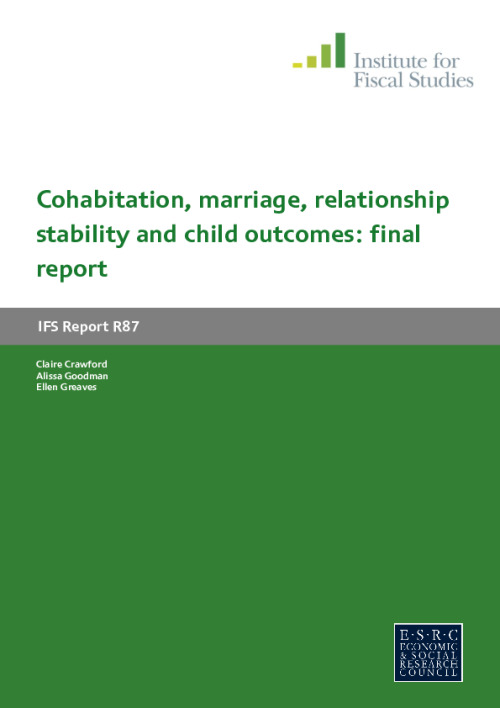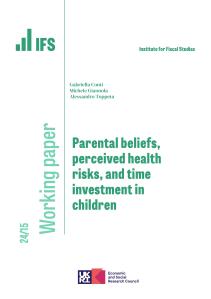Downloads

r87.pdf
PDF | 816.22 KB
This report considers the extent to which differences in parental characteristics explain gaps in cognitive and socio-emotional development between children at older ages. It documents and explores the differences between children born to cohabiting and married couples for a range of other non-cognitve skills such as engagement in risky behaviours. It draws together and extends work showing the differences in relationship stability between cohabiting and married couples, and the extent to which these differences may play a role in explaining the gaps in cognitive and socio-emotional development between children born and raised in different family forms.
Authors

Research Fellow University College London
Alissa is an IFS Research Fellow and a Professor of Economics and Director of the Centre for Longitudinal Studies at the UCL Institute of Education.

Research Fellow University College London
Claire is a Research Fellow at IFS, working on the determinants and consequences of participation in childcare and education for parents and children.

Research Fellow University of Bristol
Ellen, who was a Senior Research Economist at IFS and is now a Research Fellow, is a Max Weber Fellow at the European University Institute.
Report details
- DOI
- 10.1920/re.ifs.2013.0087
- Publisher
- Institute for Fiscal Studies
Suggested citation
C, Crawford and A, Goodman and E, Greaves. (2013). Cohabitation, marriage, relationship stability and child outcomes: final report. London: Institute for Fiscal Studies. Available at: https://ifs.org.uk/publications/cohabitation-marriage-relationship-stability-and-child-outcomes-final-report (accessed: 28 April 2024).
More from IFS
Understand this issue

If you can’t see it, you can’t be it: role models influence female junior doctors’ choice of medical specialty
24 April 2024

Sure Start achieved its aims, then we threw it away
15 April 2024

A mess has been made of Child Benefit, and the clear-up operation may not be easy
29 March 2024
Policy analysis

What you need to know about the new childcare entitlements
28 March 2024

The short- and medium-term impacts of Sure Start on educational outcomes
9 April 2024

Sure Start greatly improved disadvantaged children’s GCSE results
9 April 2024
Academic research

Imagine your life at 25: Gender conformity and later-life outcomes
24 April 2024

A senior doctor like me: Gender match and occupational choice
24 April 2024

Parental beliefs, perceived health risks, and time investment in children
15 April 2024